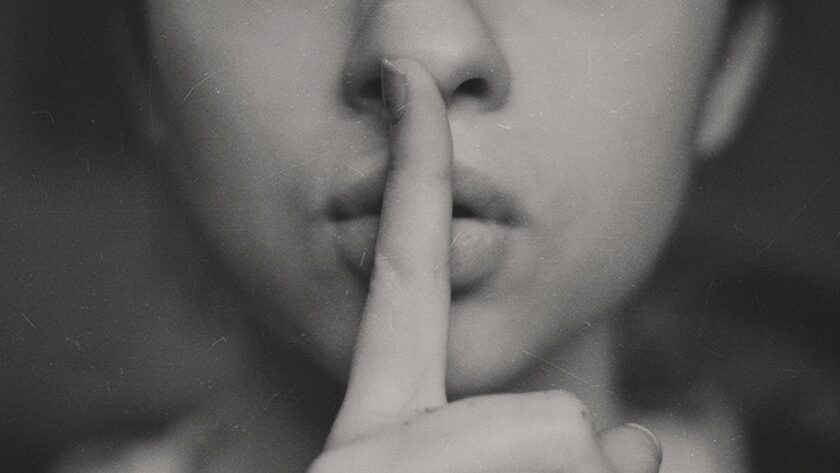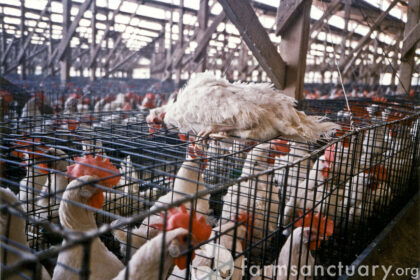You know when someone says something about vegans or veganism and you want to respond but you don’t? Feels pretty bad, doesn’t it? I get it. You’re not alone. I mean, I’ve dedicated the better part of the last five years to honing my speaking-up skills and I still fall silent sometimes. Writing helps me understand myself and the world around me so, I’ve put together a 3-part post on this topic. In Part One I have, in classic Anne style, totally over-analyzed a couple of incidents that left me wanting a do-over. In Part Two, I offer my hunches as to why this happens to me. Finally, in Part Three, my dear friend and collaborator, Suzanne McAllister shares a recent experience that left her wishing she could go back in time.

Part One: An in-depth review of lousy conversations
STATEMENT 1: A new friend said this: “Some people need a lot of protein and thus need to consume animals.”
ANALYSIS: The person who said this (who is, incidentally, very knowledgeable and kind) was responding to my informing her I am vegan. I’m not sure why she wanted to share this tidbit. I think sometimes people get nervous. There’s an automatic defensive charge sparked when non-vegans take in this fact about me. The explanation that not everyone can be vegan is a way to let at least some people off the hook. It’s a roundabout way to discredit veganism as a viable option. This can feel very irritating but, if I dig a little deeper, I can understand the reaction and this understanding soothes the irritation.
We humans will all jump through a lot of psychological hoops to maintain our version of reality and avoid the discomfort of cognitive dissonance. Consuming animals is socially normative and simply feels right to most people. When I suggest otherwise, that defensive spark is their brain working to maintain the status quo. Anything outside of the status quo is frightening and the first reaction is most often rejection. My automatic response is to help people feel at ease. It takes attention and courage to allow the discomfort and simply be with someone through it instead of trying to make it go away.
WHAT I ACTUALLY SAID: I don’t mean to judge people who have a medical condition. (I uttered something else that was equally non-impactful – so non-impactful, in fact, that I can’t remember it.)
WHAT I WISH I HAD SAID: “If someone has a condition that necessitates eating animals (although, why can’t they get more protein from plant sources???), then I suppose there’s not much to say. I can speak for myself and I can implore the overwhelming majority of people who do not have that condition to consider caring for their own bodies without sacrificing other bodies.
WHY I THINK THIS IS BETTER: It’s clear and honest. It’s what I believe. It’s delivered with warmth, not judgment. It allows me to care for the other person while staying true to myself.
WHY IT’S HARD TO SAY: I’m afraid to annoy someone. I’m worried they won’t like me. Conflict scares me.
STATEMENT 2: The same person said, “I use all parts of the animal.”
ANALYSIS: The implication is that there is something perhaps noble about not letting any part of the animal go to waste. This philosophy implies that resourcefulness makes the sacrifice okay and worthwhile. I don’t see it this way. I don’t think this makes things better in any measurable way. I believe it serves only to make us feel better about playing our role in a horror show of a system. If we can think of it from the perspective of the animals, it’s easy to see that, to them, it makes not a bit of difference. Either way, they’re dead, most likely after a miserable life. I don’t believe there’s any way to respectfully or honorably kill someone when there is no necessity to do so.
WHAT I ACTUALLY SAID: Not a darn thing. I know. I’m not proud.
WHAT I WISH I HAD SAID: “I think it’s only from our human perspective that using the whole animal makes things seem better. Being vegan means trying to see things from the animals’ perspective and I don’t think using them all up would make things better for them. I’ve thought about this so much and I simply can’t see a way to respectfully end a life when there’s no requirement to do it, whether or not we use part or all of the deceased animal.
WHY I THINK THIS IS BETTER: Same as above. There’s no judgment in the statement – just a clear expression of what I believe. It offers insight into how I see the world. Keep in mind that, even if no judgment is stated or intended, the person may experience a lot of discomfort and thus respond defensively. My intention is to accept and allow that discomfort instead of responding with my own knee-jerk, defensive reaction.
WHY IT’S HARD TO SAY: Same as above. As gentle as I deliver the message, it’s a challenge to someone’s existing belief. It shakes the status quo. I know how hard this is to accept without argument so I feel the need to brace myself for potential aggression. It’s scary and I’ll feel quite vulnerable. It takes guts.
I hope this review of my experience prompts you to think about your own interactions that have left you feeling unsettled and wishing for a do-over. I’d love to hear from you! Please feel free to contact me via the contact form. For some insights on why these interactions happen to me, please keep reading!
Part Two: Why Do I Stop Myself From Speaking Up?
So, why do I do this? Why do I stay quiet when I want to speak up? Why do I feel stumped even after years of fielding similar statements? I have a few hunches. Maybe you can relate?
I’M SLOW. It takes me a greater than average amount of time to formulate my thoughts in part because I spend a fair amount of that time checking in with my feelings before I speak. I’m also second-guessing my gut. In particular, in the northeastern United States where I reside, I am out of step with most people, especially people excitedly getting to know one another. There are upsides to my slower-than-average process. I think long. I think deep. Then, I write. It’s very conducive to writing but not so much to responding to triggering comments. When I do my tables, I have an opportunity to ask people to slow down. I ask for patience and, for the most part, asking works really well. It feels somewhat natural in that setting.
I don’t mean this as self-criticism. I like thinking deeply about topics that matter. In social situations when conversations happen very quickly, I’m still thinking deeply about something that came up 20 minutes ago. When I’m with close friends and family, it’s not uncommon for me to speak up well after everyone else has forgotten that earlier topic. It’s a quirk you get used to as you get to know me. When I’m with new people, I’m shyer about doing this and don’t know how to circle back so I reluctantly drop it, but then think about it for days. There’s nothing I can do to change what happened but I can share my do-over in writing, get something akin to catharsis and hopefully be more prepared the next time this comes up. Here’s the good news: statements related to veganism almost always come up again and again.
I’M SCARED. Fear shuts me up. Sometimes courage comes to me but not always. We humans need community and connection and it makes sense that we get a little panicky when we’re about to risk it. At the same time, we have a need for autonomy – to be seen for who we are, to be able to express our truest nature and to stand up for what we believe. Sometimes, there’s a conflict of needs and it creates that too-familiar tension. I believe that a willingness to live in that uncomfortable space, move through it, and practice compassionate honesty are the components to resolving this tension. The result, often, is healthier individuals and relationships.
I’M EXCESSIVELY HUMBLE. You might think this is a “humble” brag but I don’t think so. I’ve always considered it one of my better qualities. I see it as a quality that makes me likable and that’s probably true but, I’m troubled by a realization – that being humble makes me likable because it means I rarely challenge anyone. I’m agreeable. I have too often and sometimes inappropriately embraced a live-and-let-live philosophy. When humility is taken too far it becomes excessive deference. I was meek with my new friend and I did not like it one bit. Too much humility is not good for me, or anyone around me even if the peace it keeps makes us all feel more comfortable in the short term. Being a self-proclaimed vegan advocate demands that I speak up when I recognize the myriad explanations people use to justify the consumption of animals. But, it’s more than that. I surely owe it to the animals to speak up but I also owe it to myself. I no longer wish to make myself smaller and quieter in order to make other people more comfortable. It’s not fair to anyone and I believe that, for the most part, when I can be compassionately honest, it will lead to closer and more meaningful relationships. If I’m phony, the relationship suffers. If I’m real, we may be a little uncomfortable in the short run but in the long run, we’ll be better off.
What are your reasons for keeping quiet or even saying something you don’t actually mean? Finding commonalities is validating but we’re all a little different. In Part 3 of this post, learn how vegan activist and psychologist Suzanne McAllister would handle her do-over.
Part Three: Suzanne’s Do-Over Wish
Wanting a do-over happens more than I’d like. A conversation among friends veers in an unexpected direction. Recent example: conversation around animal companions that have recently passed, which continued with stories about the animal companions we’ve shared our lives with, and the oft-heard words ‘I LOVE ANIMALS’.
In this instance, I was hosting a small gathering of 3 women, a sibling, and 2 good friends; people I know well and whose company I enjoy. Why then did I let the topic peter out when it provided such a rich opportunity to SAY SOMETHING after hearing those words: ‘I love animals’, from folks who also eat animals.
Looking back, I don’t know if I stopped myself from saying something, or if I didn’t even think to say something until after the fact. It’s something of a blur. I think my defense mechanisms spring into action without me realizing it. I suspect I am fearful of injecting seriousness into a light, but engaging conversation, or that I would be considered a Debby Downer for bringing up a topic that could create discomfort.
My defenses are muscular and automatic. To shift gears and not comply with the defenses would require a few things: 1) recognition in the moment of what was happening – allowing for a pause, and the capacity to make a different response; and 2) the willingness to opt for discomfort over ease. I can’t get to #2 unless I cultivate #1.
I have a long time meditation practice, and have gotten better over the years at noticing what is happening within me in the moment. Some occasions – especially when I expect things to be relaxed – are ripe for ‘being in the moment’ and yet are often the times when I’m not anticipating a conversation where I have a chance to talk about my ethical choice not to eat animals. It comes up more often with strangers, or new friends, when we’re getting together for a meal for the first time and I need to let them know I’m vegan. With long term friends and family, it’s known. I’m not prepared then to shift gears and say something that might shift the conversation from how much these people love animals, but eat them, to why I love animals and don’t eat them.
Upon further reflection about Sunday’s gathering I realize it was primarily my sister’s presence that caused me to keep my mouth shut. She has flat out told me ‘I don’t want to know (about animal cruelty, etc.), because then I’d have to change’. She is clear and direct about this. So, if I were to say something, I am going against her wishes. Or, do I honor my desire to speak up for the voiceless. This situation, in particular with family, is fraught for me. With friends – who I can choose – I find if someone is adamant about not being open to talking about my veganism, the friendship is on flimsy ground. I would likely talk to that person about our avoidance of a topic that is central to my life. I have never asked anyone to become vegan, but my friends and I talk about it: my veganism, and why they are not vegan. In fact, I did an interview on my YouTube channel – Interviews with a Friendly Vegan – with a good friend about why she is not vegan. https://youtu.be/3IeuRtaswJo
Going back to last Sunday, what might I have said, even in the presence of my sister.
Perhaps: ‘my love for animals is what prompted me to adopt a vegan lifestyle’ (truth be told – I didn’t think of that on my own – only after consulting with a good friend who offered that suggestion).
My response would more likely have been: ‘It always mystifies me how people talk about loving animals, but then eat them’ – NOT A GOOD RESPONSE – almost guaranteed to provoke defensiveness in them.
So, do I get a ‘do-over’? For sure. I will have lots of chances in the coming weeks, months, and years. For me, it started with feeling uneasy after the gathering, and that feeling stayed with me. Then, thankfully having a friend I can talk openly with about the missed opportunity, who helped me come up with an option that felt good to me. It would still take courage – I would be redirecting the conversation – possibly making the others a bit uneasy – but the focus would be on me – why I became vegan, hopefully not producing defensiveness in them. Even if my comment ended the discussion, I would have planted a seed. My goal isn’t to convince people to become vegan (even though that would be a dream come true), but to pepper my day-to-day conversations and activities with speaking my truth and perhaps making someone pause and think.





